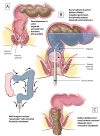The Functional Implications of Transanal Irrigation: Insights from Pathophysiology and Clinical Studies of Neurogenic Bowel Dysfunction
- PMID: 38541753
- PMCID: PMC10971655
- DOI: 10.3390/jcm13061527
The Functional Implications of Transanal Irrigation: Insights from Pathophysiology and Clinical Studies of Neurogenic Bowel Dysfunction
Abstract
Defecation function is negatively impacted in patients with neurogenic bowel dysfunction (NBD), who require effective bowel care for stool evacuation. NBD comprises fecal incontinence and/or constipation, which can reduce the quality of life and dignity. Transanal irrigation (TAI) is recommended by several clinical guidelines as the second-line treatment after conservative treatment and before surgical options are considered. As the only class in the second-line treatment with an established safety and efficacy profile, the mechanism of action of TAI has not fully been elucidated when administered through a rectal catheter with a balloon. This review examines the current understanding regarding the mechanism of action of TAI, with a focus on the pathophysiology of neurogenic bowel and irregular defecation. By understanding the functional implications of TAI, clinicians may be better able to integrate this modality into bowel care programs, especially for patients with NBD who have significant constipation due to delayed colonic motility and impaired stool emptying with loss of voluntary control of defecation, and those who are unresponsive to conservative treatment, including enemas.
Keywords: chronic constipation; colonic motility disorder; fecal incontinence; impaired anal sphincters; neurogastroenterology; neurogenic bowel dysfunction; transanal irrigation.
Conflict of interest statement
M.T. is a Senior Medical Affairs Program Manager at Coloplast A/S, which manufactures the Peristeen system. G.R., S.K., M.M. and M.C. have been involved as consultants at Coloplast A/S.
Figures

Similar articles
-
Transanal irrigation is effective in functional fecal incontinence.Eur J Pediatr. 2017 Jun;176(6):731-736. doi: 10.1007/s00431-017-2902-3. Epub 2017 Apr 12. Eur J Pediatr. 2017. PMID: 28401344
-
Prospective evaluation of transanal irrigation for fecal incontinence and constipation.Tech Coloproctol. 2017 May;21(5):363-371. doi: 10.1007/s10151-017-1635-7. Epub 2017 May 26. Tech Coloproctol. 2017. PMID: 28550422
-
[Transanal irrigation for bowel and anorectal management in spinal cord-injured patients].Prog Urol. 2012 Jul;22(8):467-74. doi: 10.1016/j.purol.2012.04.010. Epub 2012 May 30. Prog Urol. 2012. PMID: 22732582 French.
-
Management of neurogenic bowel dysfunction.Eur J Phys Rehabil Med. 2011 Dec;47(4):661-76. Eur J Phys Rehabil Med. 2011. PMID: 22222963 Review.
-
Transanal Irrigation for Neurogenic Bowel Disease, Low Anterior Resection Syndrome, Faecal Incontinence and Chronic Constipation: A Systematic Review.J Clin Med. 2021 Feb 13;10(4):753. doi: 10.3390/jcm10040753. J Clin Med. 2021. PMID: 33668658 Free PMC article. Review.
Cited by
-
Bowel perforation following transanal irrigation in low anterior resection syndrome.J Surg Case Rep. 2025 Aug 4;2025(8):rjaf588. doi: 10.1093/jscr/rjaf588. eCollection 2025 Aug. J Surg Case Rep. 2025. PMID: 40765638 Free PMC article.
References
Publication types
Grants and funding
LinkOut - more resources
Full Text Sources
Research Materials

